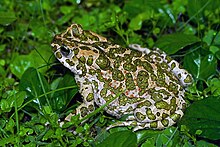Bufo viridis
| European green toad | |
|---|---|
 |
|
| Scientific classification | |
| Kingdom: | Animalia |
| Phylum: | Chordata |
| Class: | Amphibia |
| Order: | Anura |
| Family: | Bufonidae |
| Genus: | Bufo |
| Species: | B. viridis |
| Binomial name | |
|
Bufo viridis Laurenti, 1768 |
|
 |
|
| Synonyms | |
|
|
The European green toad (Bufo viridis) is a species of toad found in mainland Europe. It lives in many habitats, including steppes, mountainous areas, semi-deserts, and urban areas. The species comprises at least 12 major evolutionary lineages, and there are variations in the color and pattern of this toad across its range. The spots on the back vary from green to dark brown and sometimes red spots appear, too. The underside is white or very lightly coloured.
The European green toad will change colour in response to heat and light changes. Females are larger than males and can lay 9,000 to 15,000 eggs at a time.
It can reach a maximum size (head and body length) of 10 cm (about 4 inches), but growth to this size is rare.
B. viridis eats a variety of insects and invertebrates, mainly crickets, meal worms, small butterflies, earthworms, moths, beetles and caterpillars. There has also been a reported attack on a bat.
The European green toad requires minimal care space. Like other toads, it enjoys hiding and should be provided with decor to allow for this. Peat moss is a useful accent to its environment, as the moss not only provides a hiding space but also helps keep humidity levels up.
...
Wikipedia

